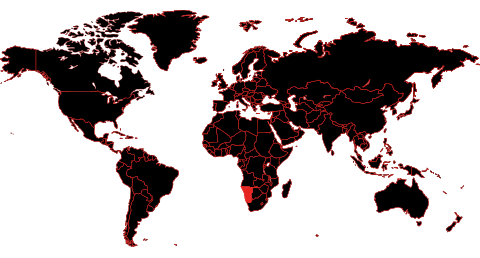How Namibia Can Avoid the Resource Curse (Managing Oil Wealth)
The discovery of oil is often celebrated as the beginning of a country’s economic transformation. For Namibia, the past year has been defined by major offshore finds, drawing global energy giants into the country’s waters and positioning it as one of the most exciting new oil frontiers.
But history has shown that oil wealth does not automatically translate into national prosperity. In fact, many resource-rich nations have seen their economies struggle due to mismanagement, corruption, and an overdependence on oil revenue—a phenomenon widely known as the resource curse.
With production timelines being finalized and billions in foreign investment flowing in, Namibia stands at a crossroads. Will it learn from the mistakes of other oil-rich nations, or will it fall into the same traps that have derailed economies across Africa, South America, and the Middle East?
A Pattern Namibia Must Avoid
The resource curse, also known as the paradox of plenty, occurs when countries rich in natural resources experience economic stagnation, political instability, and social inequality, rather than growth and prosperity.
Some of the most striking examples include:
• Nigeria: Despite decades of oil wealth, the country struggles with high poverty rates, corruption, and economic instability due to poor revenue management and over-reliance on oil.
• Venezuela: One of the world’s largest oil producers fell into economic collapse after failing to diversify its economy beyond petroleum.
• Angola: Massive oil exports generated revenue, but inefficiencies in governance and misallocation of funds left much of the population in poverty.
These nations had the potential for lasting economic transformation but instead became examples of how oil wealth can undermine sustainable development when not managed correctly.
Namibia has a chance to break this cycle—but only if the right strategies are put in place from the very beginning.
A Fresh Start in Oil Governance
Unlike many long-established oil producers, Namibia has a unique advantage: It is entering the oil era at a time when global best practices are well-documented, and the pitfalls of mismanagement are widely understood.
What Namibia does today will determine whether it becomes the next Norway—a country that has successfully used its oil wealth to build a strong economy and a thriving sovereign wealth fund—or follows the path of nations that have allowed oil revenues to fuel corruption and economic instability.
Three key factors set Namibia apart:
• A Late Mover Advantage: Namibia can study and adopt governance models that have worked in other nations, rather than experimenting with its own at the cost of national development.
• A Relatively Stable Political Climate: Unlike some oil-rich nations that discovered oil amid internal conflict, Namibia has a strong governance structure and the ability to enact sound policies.
• Global Interest in Energy Transition: As Namibia develops its oil sector, it can simultaneously position itself as a leader in sustainable energy, ensuring long-term economic diversification.
These factors create a window of opportunity—but only if the right policies and frameworks are put in place before oil revenues begin flowing.
The Three Pillars of Oil Wealth Management
To turn oil discoveries into long-term national prosperity, Namibia must focus on three critical areas:
A. Establishing a Strong Sovereign Wealth Fund
One of the most effective ways to avoid the resource curse is by creating a sovereign wealth fund (SWF) that safeguards oil revenue for future generations.
• Norway’s Government Pension Fund Global is widely considered the gold standard, with strict regulations on how oil profits are invested and withdrawn.
• Namibia must ensure that its SWF is independent of political interference, with clear rules on withdrawals, transparency, and long-term investment strategies.
• The fund should prioritize reinvestment into sectors beyond oil, such as infrastructure, education, healthcare, and renewable energy.
B. Economic Diversification Beyond Oil
A common mistake among oil-rich nations is failing to develop other industries, leading to complete dependence on petroleum exports.
• Namibia must invest in manufacturing, agriculture, technology, and tourism to ensure a balanced economy.
• Oil revenue should be used to develop infrastructure and industrial capacity, creating long-term employment opportunities.
• Partnerships with foreign investors should include knowledge transfer programs, ensuring that Namibians gain skills in engineering, project management, and finance.
C. Transparent and Accountable Governance
One of the biggest risks associated with oil wealth is corruption. To prevent this, Namibia must ensure that all oil revenues are tracked, audited, and publicly disclosed.
• Implementing strict anti-corruption measures in oil contracts and revenue allocation is essential.
• Establishing an independent oversight body to monitor oil profits and government spending can help prevent misuse of funds.
• Encouraging civil society participation and media transparency will ensure that the public remains informed about how oil revenues are being used.
The Role of International Partnerships and Investors
As Namibia enters the oil market, it will need foreign investment, technical expertise, and infrastructure development. However, these partnerships must be structured in a way that ensures Namibia retains control over its resources and maximizes national benefits.
• Contracts with multinational oil companies should include local content policies, ensuring that Namibian businesses and workers are directly involved in the supply chain.
• Revenue-sharing agreements should be fair and transparent, preventing multinational corporations from extracting resources without reinvesting in the country.
• Namibia must negotiate strong regulatory frameworks that protect national interests while still attracting investment.
If managed correctly, Namibia’s oil sector can serve as a catalyst for sustainable economic growth rather than a source of dependency and instability.
Oil wealth does not guarantee prosperity—it is merely a tool that, if managed wisely, can transform a nation. Namibia is in a position to rewrite the narrative of resource-rich countries by prioritizing good governance, economic diversification, and long-term sustainability.
The choices made in these early years of the oil boom will determine whether Namibia becomes a model for responsible oil management or another cautionary tale of wasted potential.
The work starts now.
Key sources:
•IMF Report on Resource Management (Sep 2023) – How Oil Nations Can Escape the Resource Curse
•Norwegian Oil Fund Policy Papers (Sep 2023) – Lessons from Norway: Structuring a Sovereign Wealth Fund
•Ministry of Finance Namibia (Sep 2023) – Fiscal Strategies for Long-Term Oil Revenue Management
Earth Day 2025 – Our Power, Our Planet
“Our Power, Our Planet” — the theme of Earth Day 2025 — is not just a rallying cry for envir
Positioning Namibia’s Youth at the Center of Its Energy Future
Namibia stands at a pivotal moment in its national development, faced simultaneously with a signific
What Every Namibian Student and Entry-Level Professional Should Know About the Upstream Oil & Gas Sector
The upstream oil and gas industry in Namibia is no longer a theoretical possibility—it is a rapidl




